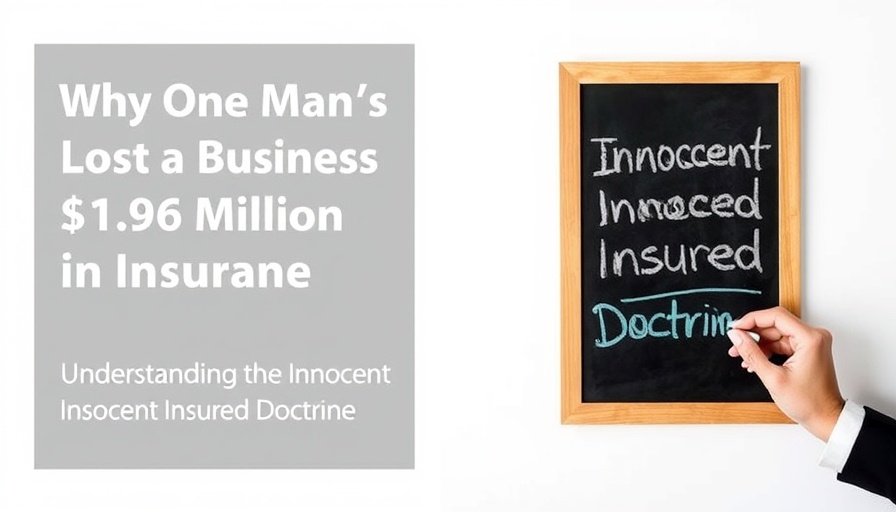
Understanding the Innocent Insured Doctrine and Its Consequences
In a stark reminder for property owners in South Carolina and beyond, a recent Minnesota court decision has underscored the impact of the “innocent insured doctrine.” This legal principle reveals the harsh reality that when a controlling individual commits fraud in an insurance claim, the repercussions can blanket the entire business, potentially leaving innocent stakeholders empty-handed. Understanding this doctrine is vital for anyone navigating the complex waters of insurance claims.
What Happened: A Case Study
To grasp the implications of the innocent insured doctrine, let’s look at a recent case involving the Press Bar and Parlor in Minnesota. Following a devastating fire in February 2020, which was ruled a result of arson committed by Andrew Welsh, the lawsuit that followed showcased the disturbing outcomes of fraudulent actions. Andrew Welsh, who was not only the CEO but also handling the insurance claims for his company, submitted a false proof of loss claiming the fire's origin was unknown. A thorough investigation later revealed the fire was intentionally set by him, for which he pleaded guilty to arson.
Despite the presence of Jessie Welsh, his co-owner and former wife, the court decided that her claims were void due to Andrew's fraudulent actions. The Eighth Circuit Court ruled against them, reinforcing the principle that the fraudulent actions of a principal can not only implicate the individual but also spell disaster for the entire corporate entity, as was the case with Timeless Bar, Inc. and Horseshoe Club, LLC.
What This Means for South Carolina Residents
For residents of South Carolina, this case serves as a powerful warning. Operating a business through formal entities like LLCs or corporations means that, legally, these businesses act only through their agents. When an agent engages in fraudulent behavior, such as submitting dishonest insurance claims, the legal consequences fall heavily on the business itself. This reality forces business owners and stakeholders to contemplate their vulnerabilities in the insurance landscape.
How Insurance Companies Use Bad Faith Tactics
This case throws light on broader issues within the insurance industry, particularly tactics used by insurers that may border on bad faith. In many instances, adjusting claims and working with insurance companies can be fraught with challenges and obstacles, often stemming from the very policies intended to protect business owners. Insurers leverage these legal doctrines to deny claims, dodge coverage, and create roadblocks, causing frustration for those seeking rightful reparations.
Understanding these tactics is essential for property owners. Whether it’s through miscommunication, delays in processing, or outright denial of claims, many people are left fighting against insurers who utilize their established power to minimize payouts. From the tactics of deceptively worded policies to strict adherence to the letter of the law, recognizing these strategies can equip you to better defend your claims.
What to Do When Facing Insurance Claim Denial
So what should you do if faced with a denied claim? It’s critical to first understand your rights and then take proactive measures:
- Document Everything: Keep detailed records of all communications and transactions. This includes emails, phone conversations, and any correspondence with your insurer.
- Understand Your Policy: Familiarize yourself with the terms and exclusions in your insurance policy. This knowledge can empower you when you challenge a denial.
- Consult Professionals: If you believe that your claim is being handled in bad faith or denied unjustly, contacting a legal expert specialized in insurance claims can provide valuable insights and strategies.
Conclusion and Call to Action
The innocent insured doctrine's implications remind us of the delicate balance that exists within the realm of insurance claims. Whether you’re an entrepreneur or an everyday homeowner, it’s essential to protect your insurance rights and approach claims with awareness and caution. Educating yourself about potential adjuster tricks and unfair practices is an empowering step towards securing your rightful compensation, should issues arise.
Are you dealing with a denied insurance claim? Seek out qualified professionals who can guide you through this intricate process and advocate for your rights. By doing so, you can level the playing field against insurance companies that may not have your best interests at heart. Don’t hesitate to act—for your future deserves protections that are not only promised but delivered.
 Add Row
Add Row  Add
Add 




Write A Comment